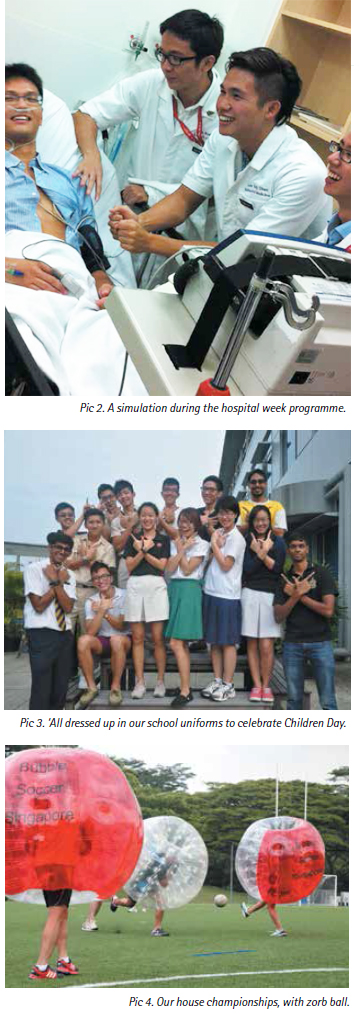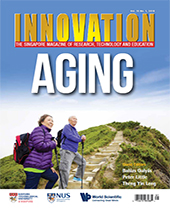|
by Nathaniel Tan

 ention the phrase 'medical students', and an image of bespectacled students hunched
among mountains of textbooks containing
nothing more than words and anatomical
illustrations comes to mind. At the Lee Kong Chian School
of Medicine (LKC), however, the reality cannot be further from this.
Now into its third year, the joint partnership between Singapore's
Nanyang Technological University and London's Imperial College
is pushing frontiers with its innovative teaching methods, with
Team-Based Learning sessions and iPad-based learning featuring
heavily in its pedagogy. Couple this with a teeming student life,
and the school is a vibrant place for work and play. ention the phrase 'medical students', and an image of bespectacled students hunched
among mountains of textbooks containing
nothing more than words and anatomical
illustrations comes to mind. At the Lee Kong Chian School
of Medicine (LKC), however, the reality cannot be further from this.
Now into its third year, the joint partnership between Singapore's
Nanyang Technological University and London's Imperial College
is pushing frontiers with its innovative teaching methods, with
Team-Based Learning sessions and iPad-based learning featuring
heavily in its pedagogy. Couple this with a teeming student life,
and the school is a vibrant place for work and play.
Lecture Theatres Out, Team-Based Learning and iPads In
The most noticeable difference when one begins his journey at LKC is the huge change in teaching style from what we are used to in Junior College or Polytechnic. Gone are the hours spent in lecture theatres listening to lecturers drone on and on, or frantically trying to take down notes while the lecturer rushes on and on.
Instead, lectures are uploaded online, and we are free to access them any time before the start of the session via our computers or school issued iPads. Now, armed with the ability to speed up, slow down and replay our lectures, learning takes place at the pace of the learner, allowing for greater efficiency and effectiveness. Unsurprisingly, the downside to this is that you have to make sure you do your lectures in the first place, and thus discipline, self control and consistency are key to doing well in such a setting.
However, completing the lectures is only half the job done.
Twice a week, we have team-based learning sessions. These
are sessions when students get to meet 'content experts', who
are usually clinicians, researchers and healthcare professionals
specializing in the content covered in the lectures and the session,
and where learning gets carried beyond the lectures. Each
team-based learning sessions typically have four parts. The first
part is an individual assessment in which students are tested on
their knowledge of the content covered in lectures. (Pic 1) The
second part is a team assessment based on the same questions,
giving students the chance to learn and clarify simple doubts with their teammates. The third part is a 'burning questions' segment,
when students would pose questions pertaining to the lectures
or assessment questions to the content experts. This segment
typically involves the most debate, as students are usually asked to
research and answer each other's questions first before the content
experts chip in with their detailed explanations. Such debate allows
students to once again learn from each other. Finally, the fourth
part of the team-based learning session is an application exercise,
when students are given clinical scenarios and asked questions
outside the scope of the lectures. These usually take an hour, and
are followed by a discussion session on the clinical scenarios and
the answers to the questions. The application exercises give us a
chance to step out of the classroom, albeit figuratively, to deal
with real life situations, and hence provide valuable insights that
cannot be gleaned from textbooks.
4 Weeks of School and Into the Hospitals We Go
Another notable feature of LKC's curriculum is the strong focus
on clinical practice. As early as 4 weeks into school as a fresh
medical student, we are thrust into the wards and operating
theatres as part of the school's hospital week programme. (Pic 2)
It is an opportunity to be exposed to the hospital environment,
talk to patients and most importantly, understand the patient's
perspective. Having such exposure so early in our life as a medical
student helps put us on the right track by reminding us of the
reasons we applied to medical school.
Clinical exposure, however, does not end there. It continues
at a fast pace, with a polyclinic week following shortly, followed
by almost weekly sessions of integrated clinical practice. These
sessions are highly varied, but fall into 3 major categories. The
first, practical skills, focuses on procedures such as suturing, wound
dressing, and venepuncture, just to name a few. The second,
clinical methods, focuses on physical examinations. The third,
clinical communications, focuses on consultation techniques and
skills, as well as communicating diagnosis, bad news, and in little
shared language. Integral to this are the many opportunities to
interview simulated patients, which play a crucial role not just in
allowing us to hone our consultation skills and build our empathy,
but also to reduce our fear and awkwardness when speaking with
patients. Having these sessions regularly throughout our preclinical
years help ensure we are well-versed with our clinical skills
to prepare for our clinical years. And of course, who can deny that
doing things hands on is always more fun and interesting than
just sitting in the classroom.
All Work and No Play Makes Jack a Dull Boy
Yes, just because we are medical students does not exempt us from
the above statement. In LKC, the student calendar is packed with
student activities. It doesn't matter if you are the kind who loves
sweating it out, or the kind who will stay out of the sun at all cost,
as we have a wide range of activities tailored to suit different tastes.
As with the other faculties in NTU, we do participate in events
such as the inter-faculty games, and organize our own yearly
Dinner and Dance and Freshmen Orientation Camp. However,
there are also many events unique to the LKC calendar. If you love
sports, we have the annual MedNurse games, a friendly sporting
competition jointly organized with the NUS Yong Loo Lin School
of Medicine and the Alice Lee Centre for Nursing Studies. On the
other hand, if you are gifted in music or dance, the Peanut Butter
and Jam event (PB&J) is an open-mic event for you to showcase
your talents. Other little events, such as our Children's Day event,
when students come to school dressed in their school uniforms,
and our Halloween event, which transforms the school day into
a mini costume dress party, ensure that no one is left out from
our activities. (Pic 3)
No mention of student life in LKC is complete, however,
without the mention of the house system. There are 5 houses in
LKC, named after prominent clinicians or scientists. These houses
are William Osler, Marie Curie, Lim Boon Keng, Wu Lien Teh,
and Alexander Fleming house. The houses serve as an important
form of support, as we are assigned house tutors who help guide
us on an individual level. This is complemented by a buddy
system, where seniors are paired with juniors. The house system, unsurprisingly, comes together with the
house championships, consisting of a rather
creative repertoire of events, with games
such as handball, quidditch, citadel, family
feud and zorb ball, all coming together to
determine the eventual champion house.
(Pic 4)
What I enjoy most about life in
LKC, though, is the small cohort sizes. With
batch sizes of 54, 78 and 90, we spend a
lot of time together, be they during the
team-based learning sessions, in hall, or
during our many events. This has created a
homely environment where everybody knows
everybody, granting many opportunities to
forge meaningful friendships. Indeed, such a
culture is a rare and much appreciated gem.
So What Does It Take?
Many people have asked me ¡®So what is the secret to getting into
medical school?' Unfortunately, as much as I would like to give a
comprehensive answer, I cannot. There is no one secret formula to
get into medical school. Instead, I have resorted to giving a simple
answer ¡®Just be yourself.' Clich¨¦ as it may sound, it is important
to ask yourself ¡®Why do I want to study medicine?' It should be
a personal reason, not one impressed upon you by your parents,
your friends or even society. The interview format has changed,
and memorizing long scripts of model answers will no longer
get you far. In the new mini-interview format, you can be asked
practically anything. This is why it is important to hold true to
your values, your beliefs and your reasons for doing medicine,
and use these to guide your answers and stay consistent through
all the stations. An advantage of having so many stations is that
even if you did not do well for one, you can always cover up for
it using the other stations. So do not be discouraged if you think
you performed badly for one. Just forget about it, maintain your
confidence, and move on.
Of course, do not neglect your academic results, your CCAs,
your external projects, and your BMAT. These are very important
too!
At the end of the day, if you think medicine is the career for
you, then don't hesitate to apply to join us at the Lee Kong Chian
School of Medicine. We cannot wait to have you join our lively
and friendly family. (Pic 5)
 Click here to download the full issue for USD 6.50 Click here to download the full issue for USD 6.50
|



 ention the phrase 'medical students', and an image of bespectacled students hunched
among mountains of textbooks containing
nothing more than words and anatomical
illustrations comes to mind. At the Lee Kong Chian School
of Medicine (LKC), however, the reality cannot be further from this.
Now into its third year, the joint partnership between Singapore's
Nanyang Technological University and London's Imperial College
is pushing frontiers with its innovative teaching methods, with
Team-Based Learning sessions and iPad-based learning featuring
heavily in its pedagogy. Couple this with a teeming student life,
and the school is a vibrant place for work and play.
ention the phrase 'medical students', and an image of bespectacled students hunched
among mountains of textbooks containing
nothing more than words and anatomical
illustrations comes to mind. At the Lee Kong Chian School
of Medicine (LKC), however, the reality cannot be further from this.
Now into its third year, the joint partnership between Singapore's
Nanyang Technological University and London's Imperial College
is pushing frontiers with its innovative teaching methods, with
Team-Based Learning sessions and iPad-based learning featuring
heavily in its pedagogy. Couple this with a teeming student life,
and the school is a vibrant place for work and play.
 Click here to download the full issue for USD 6.50
Click here to download the full issue for USD 6.50